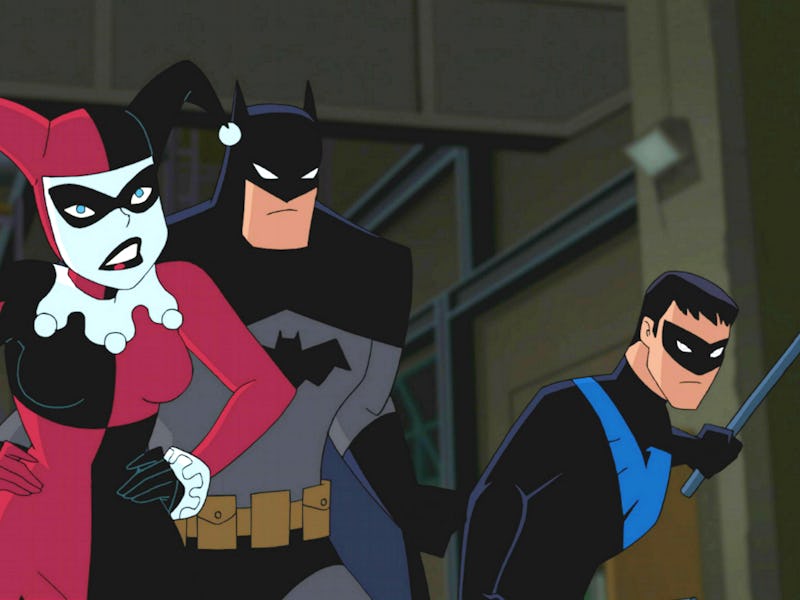
In a new, official DC animated film, Harley Quinn actually talks about being offered to work in porn. DC animated projects are notorious for overtly sexualizing and underserving their female characters, and the recently released Batman and Harley Quinn doesn’t look to be too different.
A scene from the film uploaded on Wednesday opens on Harley Quinn having tied Nightwing up in a condemned building. Harley shows him her pile of rejection letters in response to Nightwing calling her a criminal (even after she’s “gone straight”); then he puts down the fact that she’s a waitress now.
“There are other jobs,” Nightwing says, to which Harley replies: “Oh, sure, I got a ton of offers. We got a very special role for you in Bad Girls After Dark. And you gotta love this one: a tasteful pictorial shot in Thailand for legal reasons. You say I’m a criminal, they say I’m a whore.”
While it’s worthwhile to explore the idea that former criminals don’t have have too many options if they want to go clean. And it’s not far-fetched to imagine that a reformed female villain would get offers to work in porn. It’s surprising that DC would entertain the idea of the so-called “fourth pillar” of DC Comics (after Batman, Wonder Woman, and Superman) doing porn.
This representation of Harley Quinn is what DC is putting out to capitalize on her popularity, to continue to grow her stock. DC would never do something like this with their big male characters. But even if they did, it wouldn’t have the same result. Male characters don’t have the history that female characters do of being sexualized in media, nor are they treated the same in real life.
It’s also representative of a problematic approach to the character seen later in the scene (and most likely, in the rest of the film, which is rated PG-13).
After Harley talks about receiving offers to work in porn, her half-naked body is shown off in a particularly male gaze-y fashion, which most definitely gives Nightwing a boner. But that’s not all. Harley notices his erection, resulting in her turning the light off and climbing on top of him. Nightwing seems to give consent here, but Harley definitely has the power in the situation, given that he’s tied up and she turns off the light before he’s said anything about agreeing to have sex. As io9’s Beth Elderkin points out, “If the genders were reversed, we’d be seeing it in an entirely different way.” (UPDATE: The article previously didn’t address the iffy demonstration of consent in the scene, and has been updated to account for this.)
Harley switches off the light before Nightwing says whether he wants to have sex, an action that seems to signal she wouldn't take "no' for an answer, anyway.
To be clear, the sexuality, clothing, and career choices of women shouldn’t be policed or stigmatized. But things sometimes get suspect with characters whose stories aren’t dictated by someone of the same gender or sexual orientation. While Harley’s sexuality has been explored before without it feeling like fan service, that isn’t the case here.
As mentioned before, DC’s animated projects have been particularly guilty of mishandling their female characters in recent years. Last year’s Batman: The Killing Joke further complicated Barbara’s role in the original comic by having her and Batman have sex, prior to her being raped and shot through the spine by the Joker. Instead of expanding her role in a way that gave her more agency — a widely acknowledged issue with the original comic — it just provided more justification for Batman to fight the Joker.
In the same year, Justice League vs. Teen Titans seemed to take every chance it could to emphasize Starfire’s sexuality, even compromising her in the film’s transformation sequence compared to her male teammates. And the 2015 webseries Justice League: Gods and Monsters Chronicles, which in many ways subverts traditional depictions of iconic DC characters, “changed” both Wonder Woman and Harley Quinn in ways that prioritized their sexuality.
You see a few of the same key people (read: men) working on these DC animated projects, which makes it seem like, even when they do encounter controversy, nothing happens to them. They aren’t told to do things differently the next time. They aren’t replaced. It gives the impression that DC finds the idea of their female characters being repeatedly sexualized as perfectly acceptable. Which it isn’t.